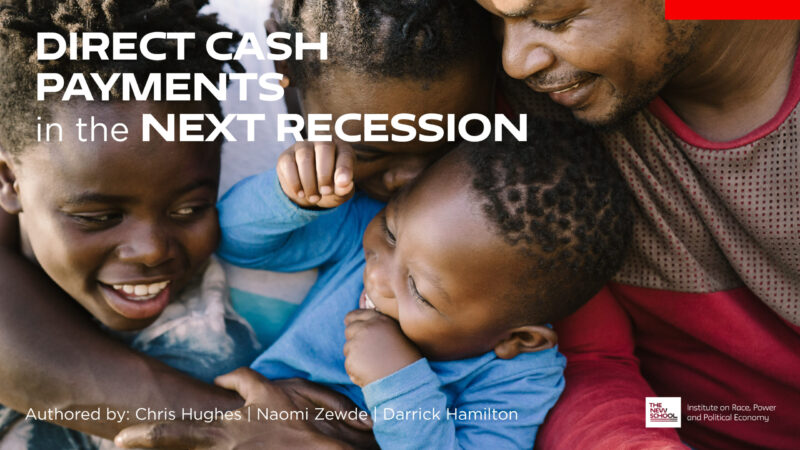Press Release
New Report Urges Congress to Establish Automatic Direct Cash Payments for the Next Recession
12. 14. 2023
A new report draws on lessons from the fiscal response to COVID-19 to outline a proposal for cash-based automatic stabilizers.

Direct Cash Payments in the Next Recession
New report by the Institute on Race, Power & Political Economy at the New School
Visit link (opens in new tab): New report by the Institute on Race, Power & Political Economy at the New SchoolNew York, NY (December 13, 2023)—How can policymakers proactively ensure that American families and the U.S. economy are safeguarded in the next recession? Direct Cash Payments in the Next Recession, a new report released by the Institute on Race, Power and Political Economy (the Institute) at The New School and co-authored by Chris Hughes, Darrick Hamilton, and Naomi Zewde, proposes a new, nationwide program of monthly cash payments that would automatically begin when economic indicators signal a recession and continue until national unemployment begins to decrease again.
The proposal builds upon the successful series of large, direct cash transfers approved by a bipartisan coalition in Congress in response to the 2020-2021 coronavirus pandemic. These direct cash payments dramatically alleviated poverty while having a macroeconomic stimulative effect.
“During the pandemic, we put cash in people’s pockets—in the form of direct cash payments like the Child Tax Credit or stimulus checks—which played a big role in equipping families with the resources needed to help stave off a recession and steer the country towards a stronger post-pandemic economy,” Chris Hughes, co-founder of the Economic Security Project and a Senior Fellow at the Institute, said. “We need Congress to build on those lessons by taking action during times of economic stability to create direct cash payments that can activate at the first sign of an economic downturn. By passing automatic stabilizers now, we can avoid unnecessary political jockeying when the next crisis hits and make sure that the cash programs can reach the people who are hit hardest by an economic downturn.”
The cash-based automatic stabilizers proposal is designed to be timely, effective, and anti-racist in its design, management, and implementation. To support the working-class people most vulnerable to economic disruption, while maximally stimulating the economy, the payments would be targeted to households making less than the median household income, with higher payments for lower-income households. Adults living in families making less than $78,000 a year would receive, on average, roughly $3,500 annually, with additional funds provided to those with children. The proposal is expected to boost the income of the average family in America between 3.2 and 4 percent, with the income of the average Black family in America increasing between 6.6 and 8.3 percent, and a 60 percent increase in income for Black families at the 10th income percentile. The total cost would approximate the same level as the COVID payments, roughly 2 percent of GDP.
“The economic security and stimulus from the direct cash payments issued by the IRS saved many lives and prevented a longer and deeper recession from the COVID-19 pandemic. Building on these lessons, our proposal presents an even better and targeted approach that ensures that the stimulus is more effectively and efficiently directed to those who need it the most, specifically lower-income and middle-class families, who are disproportionately Black, Indigenous, Latinx, and other people of color,” Darrick Hamilton, Henry Cohen Professor of Urban Policy and Economics at The New School and founding director of the Institute, said. “Black Americans in particular, regardless of education, tend to be employed in occupations that are more vulnerable and sensitive to recessionary downtowns. In addition to its income stabilizing aspects, our proposal provides automatic redress to the structural racist conditions that position Black workers, in every educational attainment category, as the first to be fired in an economic downturn and the last to be hired back when the economy recovers.”
The report details:
- background on existing safety-net programs and why they aren’t enough;
- the importance and necessity of automatic stabilizers;
- and the design and proposal for cash-based automatic stabilizers, focusing on five main goals: timeliness, size, stability, targeted/anti-racist, and additive.
“With some initial distance from the COVID pandemic, we can see that the direct cash transfer programs of the pandemic emergency policies were by all accounts massively effective in helping families retain their purchasing power despite extreme labor market volatility, and in significantly shortening the duration of the pandemic contraction,” Naomi Zewde, Assistant Professor in Health Policy and Management at the UCLA Fielding School of Public Health, said. “We can build on that experience to proactively create an enduring cash transfer program that will benefit Americans when the next recession arrives, supporting those whose economic position is most precarious and helping to ensure a shorter downturn for all.”
Read the full report Direct Cash Payments in the Next Recession.
The Institute on Race, Power and Political Economy advances research to understand structural inequalities and works to identify groundbreaking ways to promote equity. A premier cross-disciplinary hub, the Institute draws on faculty across The New School in New York City, which has long fostered innovative thinking about power, structure, design, politics, economics, and society. The Institute engages with researchers and practitioners, including community and business leaders, policymakers, philanthropists, and journalists across the nation and around the world. Learn more at: racepowerpolicy.org.